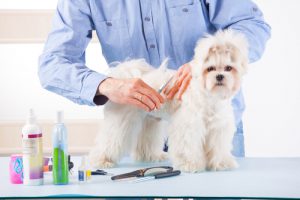When people decide that it is time for their furry friend to take advantage of grooming services, they are placing the health, safety, and happiness of their pet in the groomer’s hands. This means that pet groomers are expected to show compassion to pets in their care. But, the way that you handle a customer’s pet is not the only way to show animals in your care compassion! Focusing on proper sanitation techniques while administering grooming services is an important aspect of the business that will show the customer that you care about the health, safety, and happiness of their pet.
The Dangers of Improper Grooming Sanitation
Sanitation is important for the obvious reason that it is not a great business tactic to operate a dirty facility. Why would a customer want to bring their beloved pet to a groomer that can’t even keep up with cleanliness? It is not only a red flag to customers because of aesthetic purposes, but improper sanitation can actually cause health issues in the likes of both humans and animals. Without cleanliness in the grooming work environment, animals are subjected to contagions, sickness spread through other dogs; and zoonotic agents, illnesses that can be spread to and from humans. Examples of contagions that can affect groomed pets include lice and kennel cough.
 Some examples of zoonotic agents include fleas, rabies, and fungal infections like ringworm. Proper sanitation techniques used in grooming services are not only good for business, but they can be a matter of life and death.
Some examples of zoonotic agents include fleas, rabies, and fungal infections like ringworm. Proper sanitation techniques used in grooming services are not only good for business, but they can be a matter of life and death.
How are Contagions and Zoonotic Agents Relayed through Grooming Services?
Agents that can lead to illness from improper sanitation techniques only get transmitted through contact. Contact doesn’t always necessarily mean skin-to-skin touch. Ways to spread infectious agents include:
Direct Contact: This would be the instance of skin-to-skin contact. Common examples are a human touching a pet, a pet touching another pet, and a pet touching a human.
Indirect Contact: When a pet that is carrying an infectious agent touches a towel, brush, or other grooming tools and then that object is used on another pet, the second pet is at risk for the infectious agent as well. Indirect contact can spread these agents through blood, skin, hair, feces, and urine.
Water: Standing and diluted water is an open invitation for bacteria’s that can be spread to pets and cause illness.
Air: Agents can even be spread through the air, which is hardest to control or prevent.
Feet: Infectious agents found on the ground can be spread to other areas by way of walking. This means that groomers that don’t adhere to pet grooming sanitation expectations put their own pets at danger for infectious disease by carrying agents home with them.
Tips to Prevent Sickness Due to Infectious Agents
First and foremost, to reduce the chance of direct contact from any sickness, groomers should wash their hands between each and every pet client. Additionally, areas that pets are expected to be for grooming services should be cleaned after each use so that urine, blood, hair, feces, and other contracting agents will not affect the next pet. Groomers should be aware of the difference in disinfecting and sanitizing, as sanitizing may not be enough to stop the growth of certain bacterias that can still affect the health of pets. To disinfect grooming areas, choose a component that does not involve chemicals that pets may be sensitive to. To stop the spread of toxic air agents, store clean towels and hair bows in airtight containers until their use.
Keep a Sanitation Schedule
A good rule of thumb is to keep a schedule for your sanitation routine so that you don’t miss any of the agents that could affect your clients. Daily routines should include cleaning anywhere that pets stay during their visit to the groomer. This includes grooming tables, tubs, drying areas, kennels, and any tools and equipment that was used during grooming services. Essentially, daily cleaning should include between pet visits and end-of-the-day closing. Deep cleaning should be considered weekly for areas that do not come in contact with pets.
Keep Sick Pets Away!
Sick pets may be hard to spot, but if they can be, make a rule to resist grooming services for that animal until they regain their health. You don’t want to make all of your other clients sick just because one animal had a cold! Pet groomers are not veterinarians, so they should try to prevent sickness instead of treat it. The more sickness you can prevent, the more clients you will be able to groom!
To learn more about grooming services and to find out how you can become a professional pet groomer, visit our website to learn more about Merryfield Academy in Ft. Lauderdale, Florida!
Sign up for
Free Career Report
"*" indicates required fields
